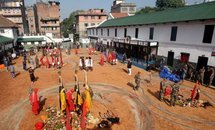Nepal: Thousands flock to 'world's biggest animal sacrifice'
Claire Cozens
KATHMANDU, Claire Cozens - Thousands of Hindu devotees have flocked to a village in Nepal ahead of the planned sacrifice of more than 300,000 animals in a ceremony condemned by animal rights activists, including French actress Brigitte Bardot.
Priests are preparing for the slaughter of more than 15,000 buffaloes and 300,000 birds, goats and sheep during the event, which starts Tuesday and is thought to be the biggest ritual sacrifice anywhere in the world.

"Thousands of people from Nepal and India have already begun arriving and preparations for the festival are in full swing," Mangal Chaudhary Tharu, the main priest at the Gadhimai temple, told AFP.
He said visitor numbers were expected to be higher this year because it is the first such ceremony since the end of Nepal's conflict in 2006 and he vowed to go ahead with the sacrifice despite the protests.
Tharu, the fourth generation of his family to serve as a priest at the temple, said he expected more than a million people to attend, over half from India, where many states have banned animal slaughter for religious purposes.
Nepal's government has refused to put a stop to what it says is a centuries-old religious tradition, and has pledged 4.5 million rupees (60,000 dollars) in funding.
"People have deep faith in the goddess and they believe that sacrificing animals will bring them good luck and prosperity for their families," said Tharu.
"I don't think the mood will be spoiled by the animal rights campaigners. They have the right to raise their concerns and we have the right to continue with our age-old tradition."
Armed police have been deployed to keep the peace and authorities have banned alcohol during the festival, which begins with the ritual sacrifice of two wild rats, a rooster, a pig, a goat and a lamb.
The meat is distributed to the devotees and to local people, while contractors bid for the animal hides -- making the slaughter a lucrative venture for the local community.
But the ceremony has been strongly opposed by animal rights campaigners, who are demanding an end to what they say is senseless cruelty.
The cause is supported by the well-known Indian animal rights activist Maneka Gandhi and by Bardot, a veteran campaigner who this month wrote to Nepal's president urging him to put a stop to the festival.
"Thousands of terrified buffaloes will have their heads cut off by drunken devotees," she wrote.
"Honorable president, I have dedicated my life to protect animals and the best gift I could receive for this lifelong struggle would be the announcement of the stopping of ritual sacrifice."
Pramada Shah, director of pressure group Animal Nepal, says the campaign has won strong support both in Nepal and abroad, although she accepts it faces an uphill struggle in this deeply conservative, majority-Hindu nation.
"In a country like Nepal it is very difficult to raise these issues," she told AFP.
"The idea of animal rights is very new here and people are so used to sacrifices, even well-educated people are resistant to change. There is a lot of work to be done here, but slowly, progress is being made."
She says attitudes towards ritual slaughter are beginning to change in Nepal, a view shared by cultural expert Chunda Bajracharya.
"Belief in these ancient rituals is deep rooted in our society," said Bajracharya, professor of cultural studies at Kathmandu's Tribhuvan University.
"But there is evidence that animal sacrifices are becoming less popular, especially in urban areas, where people are instead choosing to 'sacrifice' eggs or coconuts.
"Mindsets are gradually changing."
--------------------------------------------------------------------------------------------------------------------------------